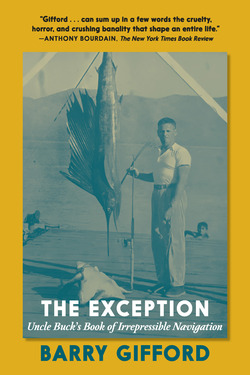Edited by Thomas A. McCarthy
Foreword by Andrei Codrescu
"Everything I have to say about race and religion and politics is in the novels," declares Barry Gifford. The Rooster Trapped in the Reptile Room gathers generous portions of all of Gifford's thirteen novels and novellas. Nine, including Wild at Heart and Night People, are restored to original sequence. The broad contours of an episodic output emerge—a full-length view of the freaks and freakish incidents that populate Gifford's unique, human comedy. As Lula, the author's favorite of all his characters, reflects, "The whole world's wild at heart and weird on top."
This world is Gifford's native habitat as much as it is his creation. The Rooster Trapped in the Reptile Room includes first-person essays that mirror the circumstances of his novels. There was the time he took his young son to visit his friend William Burroughs. Or the trip he took along the chain of Mexico-US bordertowns, exploring life on the seam. In selections from The Phantom Father, a memoir, Gifford describes his nomadic boyhood as the son of a racketeer father and fashion-model mother. A new short story, "The Peterson Fire," is a tale from the life of a boy who sounds a lot like the young Gifford himself.
Gifford began as a poet, publishing for over a decade before writing his first novel in 1979. The Rooster Trapped in the Reptile Room groups seven new poems with a selection from past work. It wasn't until the 1990s that Gifford started writing for films, a pursuit represented here with a section the screenplay to David Lynch's Lost Highway. In "Fuzzy Sandwiches or There Is No Speed Limit on the Lost Highway: Reflections on David Lynch," Gifford tells the story of his several collaborations with Lynch.
Collected in
The Best of Barry GiffordIntroducing Three Cheers: a new feature on the Seven Stories Blog. In this feature, Seven Stories authors dish on three books that helped to mold them over the course of their careers. Check out Barry Gifford's choices below!
by Barry Gifford
Grande Sertao: Veredas (Translated into English as The Devil to Pay in the Backlands by Harriet de Onis). Certainly the greatest of all Portuguese language novels, a truly transformative novel; a unique, surprising narrative that rivals Don Quixote for creativity and meaning. Written by Joao Guimaraes Rosa, Brazilian professor and diplomat.
The Adventures & Misadventures of Maqroll the Gaviereo (Translated from Spanish by Edith Grossman) by Alvaro Mutis, a Colombian raised in Belgium and Colombia and Mexico, best friend of Gabriel Garcia Marquez, who called Mutis the finer writer. Marquez was correct: Mutis’s Maqroll novellas are the finest kind of literary adventures. A vastly underrated if not mostly unknown (in the English-speaking and -reading world) master of prose and poetry.
The Collected Novels of Jean Rhys Another mostly undervalued (and misinterpreted) writer. Her novels After Leaving Mr. Mackenzie and Good Morning, Midnight (quote from Emily Dickinson, I believe) are especially good. She did not waste words: taught me how to be concise and direct without sacrificing intent and meaning. Hated being taken up in 1960s and ‘70s by feminists—resented is better word. Once a mistress of Ford Madox Ford’s, she picked up on what the big guns of the ‘20s and ‘30s had to say (Hemingway, Conrad, Pound, et al) and in my opinion outdid them all—except maybe Conrad.



























